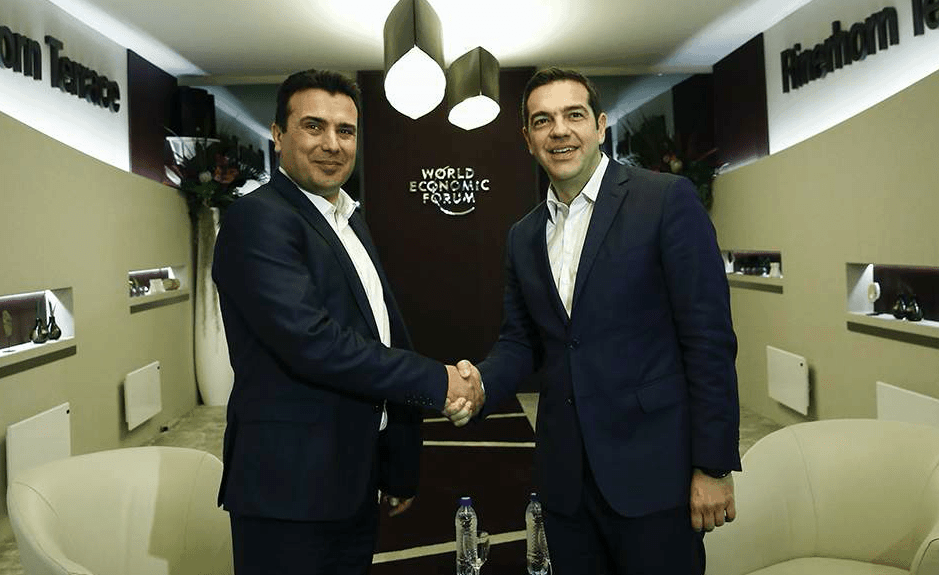
FYROM to rename its airport from “Alexander the Great” PM Zaev announced after meeting Greek counterpart Tsipras
by Aggelos Skordas
Greece’s Prime Minister, Alexis Tsipras, and his counterpart from FYROM, Zoran Zaev, had a three-hour meeting on the sidelines of the World Economic Forum in Davos, Switzerland, on Wednesday. The agenda was topped by the longstanding ‘Macedonian’ naming dispute with the two premiers appearing optimistic for a solution and willing to take steps in order to bring the neighbouring countries closer. Exiting the meeting, Tsipras and Zaev, in joint statements, clarified that cooperation and development is key for the region’s prosperity. It was the first meeting between leaders of the two countries in more than seven years.
In a display of goodwill towards the settlement of the row Zaev announced that it is his governments intension to rename Skopje’s international airport, currently named “Alexander the Great”, as well as the major highway E75. As he explained, his country does not have any irredentist claims against Greece and his government’s actions show its good faith. The move aims “to show practically that we are strongly committed to find a solution”, Zaev added. Furthermore, he said that the main motorway linking FYROM’s capital with Thessaloniki will be renamed to “Friendship”. Both Skopje airport and the highway running through the country had been named after “Alexander the Great” by FYROM’s previous government, led by nationalist Nikola Gruevski.
Referring to his country’s future in the European Union and the NATO, Zaev underlined his intention to tackle the full framework of difficulties separating Greece and FYROM: “We are committed to building trust between our countries with the ultimate goal of helping to overcome the problems between our countries. We are at a time when we can create good-neighborly relations.” Finally, he underlined that the United Nations-led negotiations will be raised to a higher level, being held directly between the foreign ministers of the two countries, in order to reach a final solution accepted by both sides and promoting both countries’ interests.
On his behalf, Tsipras, who made statements before his FYROM counterpart, declared that the neighbouring country should abort any irredentism claims against Greece and that this comes before the name: “It means that we must first tackle irredentism in all its forms and with guarantees that we will leave no window open that might allow similar provocations to be created anew in the future.” Moreover he said that the two countries “need to promote an agenda of cooperation and joint development in order for the Balkan region to go forward and meet the challenges of the 21st century”, while announcing that Athens will soon move to ratify the second stage of the FYROM-European Union Association Agreement as well as the country’s NATO ambitions if all the bilateral open issues are resolved. Greece is a member of both organisations and unanimity is required in approving new members, while in 2008 it vetoed FYROM’s candidacy to NATO due to the unsolved dispute. Tsipras also reiterated that the two countries must agree on a compound name for use in relations erga omnes (towards all).
It should be noted that, according to diplomatic sources, the United Nations Special Representative for the naming dispute between Greece and the Former FYROM, Matthew Nimetz, will visit Athens on January 30 and Skopje on February 1 in order to hold meetings with the two countries’ representatives.


